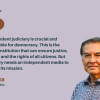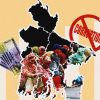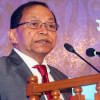A glimmer of hope for gender justice

Recently, when I introduced myself to a male lawyer, he proceeded to give me some unsolicited advice, saying that the type of cases I am interested in wouldn't bring me success because I am a woman. Within minutes of introduction, he told me that female lawyers at his chambers are irregular and undependable because they get married and have kids. He then went on to suggest that I get married as well. This was a caricature of a conversation that I believe every woman in our country goes through.
In such situations, I do a mental calculation to determine whether it's worth educating such individuals right there and then. Most days, my brain tells me no. I was there for a specific business and a 10-minute speech would hardly sanitise years of social conditioning out of that man. But it took me years of soul-searching before I could finally forgive myself for not speaking out in these situations. Honestly, as women, we are tired of educating and raising men to be better, especially when the entire social structure is designed to promote stereotypes like my conversation above. We would love it if, for a change, this burden was taken up by the system instead of each woman. And the Supreme Court of India has just shown us how to go about it in a system that is plagued by antiquated ideas about women.
When I finished the Handbook on Combating Gender Stereotypes, a 30-page booklet published by the Supreme Court of India, a peculiar blend of joy and sadness washed over me. India's Chief Justice Dhananjaya Y Chandrachud's groundbreaking initiative of endorsing a gender-just judiciary breathed life into the transformative mission of creating the handbook. Throughout this booklet, which is primarily meant to be read by lawyers and judges, India's apex court has provided an exhaustive list of stereotype-promoting language that should be replaced by alternative language. For example, lawyers and judges are encouraged to replace words like "harlot," "career woman," "whore," "woman of loose morals/easy virtue," "promiscuous/wanton woman" with the plain and simple term of "woman." The objective is to ensure that legal reasoning and writing is free of assumptions and damaging notions about women.
I cannot help but feel immense joy that the highest court of our neighbouring country has taken such a spectacular, historic step forward, and I hope that their legislature will soon show support in its favour. I wonder when our judiciary might be brave enough to take such a progressive step forward. In Bangladesh, the humiliating and unscientific two-finger test was only abolished recently, and until the Evidence Act was amended in 2022, lawyers could cross-examine rape victims about their previous sexual history to reduce their credibility. Aside from these black letter laws, there are countless patriarchal assumptions about women that find their way into courtrooms, jeopardising the scope for justice. Lawyers and judges regularly partake in endorsing these harmful notions. For example, in the headline-grabbing Narsingdi assault case of 2022, the judge implied that Bangladesh is too "civilised" for women to be wearing non-traditional clothes in rural areas, and a perpetrator has the right to protect the culture and heritage of the country by inciting violence against women who wear non-traditional clothes.
Words have power. Why do we say "child prostitute" and perpetuate the idea that it is children who decide to engage in sex work, when in reality they are victims of trafficking? For decades, our system has okayed these harmful phrases.
The handbook takes up only two pages to provide the list of alternative/preferred language; the rest of it is filled with excellent commentary on what stereotypes are, and how they can influence lawyers and judges to distort the application of law, among other issues. It also provides lists of stereotypes and compares them with a version of "reality" so that lawyers and judges can ascertain the difference and avoid applying these prejudices when they build, defend and judge a case. For example, the handbook encourages unlearning stereotypes such as "women should do all the household chores," and puts forward, "people of all genders are equally capable of doing house chores. Men are often conditioned to believe that only women do household chores."
Women are exhausted from fighting these stereotypes on a daily basis, be it with our fathers, husbands, friends, employers, colleagues or even a random person they just met. As a woman of the subcontinent constantly confronting similar stereotypes, seeing all the "reality" versions in a booklet created by the Supreme Court of India makes me feel profoundly understood. It should be noted that the use of alternative/preferred language is merely "encouraged" and not made mandatory – perhaps a smart move to sensitise the professionals first to what we can all agree is a momentous step forward for India.
Considering that judiciary is the last resort for anyone who has faced injustice, if the lawyers and judges internalise preconceived and problematic notions, how will justice ever prevail for women? I can sit here and fill the newspapers trying to raise awareness against these stereotypes, but this powerful advocacy coming straight from the Supreme Court, targeting lawyers and judges, will have unparalleled positive impact on ensuring a gender-just judicial system. As a female lawyer who is both on the receiving end of being stereotyped and who has the power to use the gender-just language in legal documents, I sincerely hope that the Indian Supreme Court's handbookwill become an exemplary piece of document that the judiciary of Bangladesh and even the legislature could endorse.
Anupoma Joyeeta Joyee is a barrister-at-law. Email: [email protected]

 For all latest news, follow The Daily Star's Google News channel.
For all latest news, follow The Daily Star's Google News channel. 








Comments